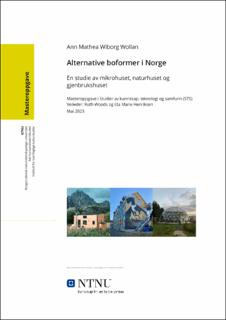| dc.description.abstract | Sammendrag
«Alternative boformer og boligpraksiser i Norge: En studie av mikrohuset, naturhuset og gjenbrukshuset» utforsker hvordan tre forskjellige alternative boformer i Norge representerer tre unike tilnærminger til bærekraft og det gode liv.
Den pågående søken etter bærekraft og bærekraftige boliger, og min nysgjerrighet på alternative boformer, er bakteppet for denne masteroppgaven. Utgangspunktet for denne oppgaven var at alternative boformer, slik som mikrohus, naturhus og gjenbrukshus kan avdekke mangler i dagens tilnærming til bærekraftige boliger.
Problemstillingen for studien er: Hvordan bidrar alternative boformer til å fremme det gode liv og bærekraft? For å få svar på dette har jeg benyttet STS-teorier om skript og domestisering, da disse perspektivene kan gi en bedre forståelse av hvordan teknologier(boliger) forstås og brukes. For å undersøke dette har jeg intervjuet tre par i tre ulike alternative hjem, samt nøkkelpersoner i hver av de tre kommunene.
Oppgavens funn viser hvordan hver av disse boformene domestiserer bærekraftige praksiser på forskjellige måter, og som dermed peker på distinkte verdier, identiteter, livsstiler og hverdagsrutiner. Mikrohuset fokuserer på minimalisme, økonomisk uavhengighet og nærhet til naturen. Naturhuset legger vekt på selvforsyning, økologi og permakultur. Gjenbrukshuset fokuserer på kritisk bruk av ressurser, fellesskap og gjenbruk. Bærekraft blir belyst opp mot FNs tredelte forståelse av bærekraft som inkluderer både miljømessige, sosiale og økonomiske aspekter.
Disse boformene utfordrer på ulikt vis det konvensjonelle og teknooptimistiske boligskriptet og byggestandarder i Norge, noe som peker på en forståelse av bærekraftige bygg som mer enn teknologiske løsninger og energieffektivisering. Studien viser hvordan bærekraftige verdier og livsstilspraksiser kan medtenktes som en sentral del av bærekraftig utvikling av boliger, samtidig som det ivaretar det gode livet. Studien peker derfor på en flerdimensjonal tilnærming til bærekraft, som inkluderer både tekniske og sosiale aspekter, og som er åpen for innovasjon og eksperimentering.
Ut ifra disse funnene konkluderer oppgaven med at informantenes erfaringer ikke kan generaliseres for hele befolkningen ukritisk, da boformene møter utfordringer knyttet til byggeregler og standarder. I tillegg kan det være vanskelig å skalere opp disse boligtypene på grunn av kostnader, infrastruktur og individuelle ressurser. Imidlertid viser funnene at alternative boformer kan bidra til en mer helhetlig, bærekraftig og meningsfull tilværelse gjennom implementering av symbolske og kognitive praksiser som inkluderer minimalisme, permakultur og gjenbruk.
Nøkkelord:
Mikrohus. Naturhus. Gjenbrukshus. STS. Skript. Domestisering. Bærekraft. Det gode liv. Byggeregler- og standarder. Energieffektivisering. Livsstil. Minimalisme. Permakultur. Gjenbruk. | |
| dc.description.abstract | Abstract
«Alternative living forms and housing practices in Norway: A study of the Tinyhouse, Naturehouse, and Reuse-house» explores how three different alternative housing forms in Norway represent unique approaches to sustainability and the good life.
The ongoing quest for sustainability and sustainable housing, coupled with my curiosity about alternative living forms, is the backdrop for this empirical research. My proposition is that alternative living forms, such as tinyhouses, naturehouses, and reuse-houses, can expose deficiencies in the current approach to sustainable housing.
The research question for the study is: How do alternative living forms contribute to promoting the good life and sustainability? To answer this, I have used STS theories about script and domestication. These are perspectives that can provide a better understanding of how technologies (houses) are understood and used. To investigate this, I have conducted interviews with three couples in three distinct alternative homes, as well as key individuals within each of the three municipalities.
The thesis reveals how each of these forms of living domesticate sustainable practices in different ways, thereby pointing to distinct values, identities, lifestyles, and everyday routines. The tinyhouse focuses on minimalism, financial independence, and closeness to nature. The naturehouse emphasizes self-sufficiency, ecology, and permaculture. The reuse-house focuses on critical use of resources, community, and recycled materials. Sustainability is illuminated against the UN's tripartite understanding of sustainability, which includes environmental, social, and economic aspects.
These forms of living challenge Norway’s conventional and techno-optimistic housing script and building standards in various ways, indicating an understanding of sustainable buildings as more than technological solutions and energy efficiency. The study shows how sustainable values and lifestyle practices can be thought of as a central part of sustainable development of housing, while maintaining the good life. Thus, the study points to a multidimensional approach to sustainability, which includes both technical and social aspects and is open to innovation and experimentation.
Based on these findings, the thesis concludes that the experiences of the informants cannot be generalized uncritically for the entire population, as the forms of living encounter challenges related to building rules and standards. In addition, it may be difficult to scale up these types of housing due to costs, infrastructure, and individual resources. However, the findings suggest that alternative living forms can contribute to a more holistic, sustainable, and meaningful existence through the implementation of symbolic and cognitive practices including minimalism, permaculture, and reuse-principles.
Keywords:
Tinyhouse. Naturehouse. Reuse-house. STS. Script. Domestication. Sustainability. The good life. Building-regulations and standards. Energy efficiency. Lifestyle. Minimalism. Permaculture. Reuse. | |
